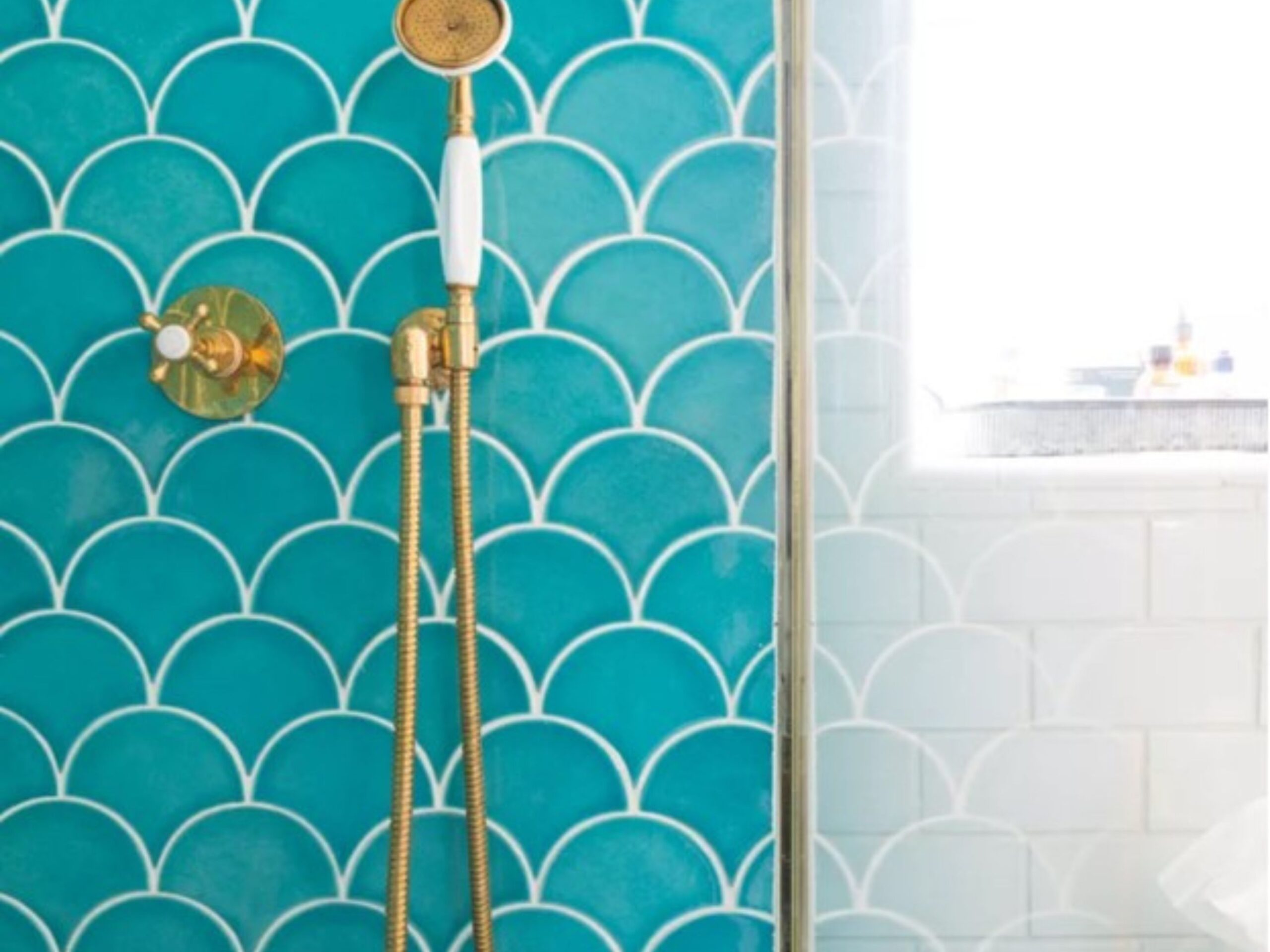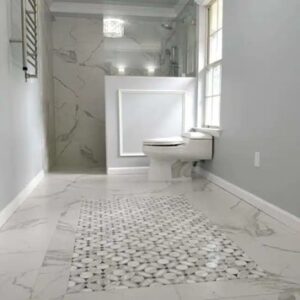Floor tile installation costs can vary based on a lot of factors, including the expertise and experience of the installer. If you’re not familiar with the trade industry, it can be hard to know what to expect in terms of costs, and also difficult to know how to find a tradesman you know you can trust.
But we’re here to help! If you’re looking to have tile installed–either as your kitchen backsplash, in a shower or on a floor, read on for the information you need.
Hiring an inexperienced tile setter or handyman may seem like a way to save money but mistakes when setting tile can be expensive to fix.
Hometown Handyman of NE Florida, LLC is a full-service remodeling company.
We work exclusively with homeowners to help them remodel using a design-build approach that saves time, avoids confusion and creates better results.
Tile Installation 101 and Contractor Requirements
Tile installation has become a lot more complex and tile installation costs have increased as a result.
20 years ago, there were basically a handful options when it came to tile size, shape and material. Today there are thousands, and the installation methods vary depending on tile material, tile size and substrate.
Tile installers need to not only be skilled in setting tile, but they must understand proper surface preparation, crack isolation, grout spacing and waterproofing to properly install tile.
On top of those skills, they also need to run a good business with proper communication and scheduling, employee training and supervision, marketing and admin.
License and Insurance
There is no professional licensing for floor tile installers in Florida. Beware of installers who tell you they are “Licensed and Insured” without documentation to back it up.
The very best tile installers will be certified by the Tile Council of North America (TCNA), a well-respected association who literally wrote the book on tile installation standards.
To get certified installers must pass rigorous written and practical tests.
Certification is not required and there are good installers who are not certified. But a TCNA certification all but guarantees your installer knows his stuff.
All installers should carry insurance – both general liability and workers compensation. Have their insurance company email you proof of insurance, a paper copy from the installer is not good enough.
Permits
Most tile installation projects will not require permits and even on larger project where permits are needed for other reasons the inspectors are not interested in inspecting floor tile.
The lack of licensing requirements, inspections, and permitting makes floor tile installation a real “buyer beware” marketplace and makes hiring an experienced professional even more critical.
Tile size, shape and pattern can all affect installation cost
Labor Installation Costs are Just One Part of the Total
Labor costs are a big part of a floor tile installation but there are other costs to consider.
Demolition and Floor Prep
The costs below do not include floor preparation or removal of the existing flooring and trim.
Some tile installers will do the floor demolition and prep, others will ask for you to have it done in advance. Removal of existing flooring can cost anywhere from $2-$5 / sq ft depending on the type of flooring.
Floor prep will be minimal on many projects but on others they could range from $2 a sq foot for an isolation membrane to $8/sq ft or more for levelling or wet set applications.
Material Costs
Most tile installers will not help you choose a tile. You will need to visit a tile showroom for that. Obviously, the thing that will affect your material costs the most is the type of tile you choose.
Ceramic tile is generally cheaper than porcelain, for example.
Tile is graded on a scale of 1-3, and the lower the number, the better the tile. Many factors such as thickness and hardness play into this scale.
Once you know what kind of tile you’re likely to use, you can start to approximate the material costs.
Tile Pattern
Simple patterns like a 50/50 stagger or stacked pattern do not add cost. But other patterns like French lay, penny tiles, herringbone etc.… will cost more as they are more time consuming and require a higher level of skill to install.
Tile Size and Type
Very large tiles and mosaics cost more to install than ‘mid-sized’ tiles like 12×12 or 12x24s. Natural stone tiles costs more to install than ceramic of porcelain.
Cheap tiles, like those from Home Depot or discount outlets, can also cost more because they are often poorly made and not square of flat and therefore take longer to install.
Grouting
Tile installation costs should include installing the grout and the type of grout should be specified in advance. We recommend acrylic grouts, and the grout joint size is specified by the manufacturer.
Rectified tiles can have quite small grout joint joints (1/8″ or less) while most tiles we have a minimum 3/8-inch grout joint.
Inexperienced installers will use grout joints that are too small (because clients ask for it) but that can cause cracking and other issues down the road.
Thin Set
One of the most important things when installing tile is getting ‘full coverage’ of thin set on the tile. Any gaps or pockets can lead to cracking or hollow sounding tile.
The right thin set must also be used. The type of thin set is determined by the type and size of tile being installed and the surface it is being installed on. Inexperienced installers will just choose the cheapest thin set which can lead to loosened tiles and cracking later.
Floor Tile Installation Costs
These labor costs are based on recent bids from our installers. The prices listed here are for high-quality, professional work specifically in a remodel. Prices for new construction, investment properties and inexperienced installers will be different.
- Mid-Sized Floor Tiles – $6 – $8/sq ft
- Mosaic Floor Tiles – $10-12/sq ft
- Large floor tiles – $10 – $15/sq ft
- Natural stone floor tiles – $18/sq ft and up
- Special patterns (French lay, herringbone etc.…) can add $2-$5 a sq ft.
In general installers who specialize in remodels are more professional, communicate better and pay more attention to keeping the jobsite clean. Installers who work on new construction tend to be more focused on speed than quality.
In apartments and investment properties, owners tend to hire lower-skilled, more inexpensive labor and handymen so those costs are not reflected here either.
Other things that can affect tile installation labor costs
We already discussed that quality installers will cost more than handymen or inexperienced installers. But there are several other factors that can affect tile installation costs.
Jobsite Access. Upstairs projects can cost 10% more than first floor ones. If you live in a condo or apartment, it can cost more than that.
If parking is difficult or there is no easy place to set up and clean up that can increase costs as well.
Demand. One reason costs are increasing is there are fewer and fewer qualified installers and there is a lot of demand right now. We don’t see demand lessening any time soon.
How fast do you need the job to be done can also affect cost. If you’re not in a tremendous hurry, you’ll pay less than you would in an emergency or rushed situation.
Jobsite Conditions. If the home or yard are disorganized, if there have been no updates for decades, if the condition of the home is poor etc.… these things can affect cost too.
Fixing someone else’s work. Is the project already started? If you hired someone else and they did a poor job, fixing their mistakes will cost more than a contractor starting from scratch. And if you started the project and realized it was bigger than you could handle, generally having a tile installer finish a DIY will cost more.
Where to Find a Trade Contractor and How to Evaluate Them
If you need a referral, feel free to give us a call and we can give you some options depending on the type and size of project you are considering.
Pros and Cons of Referrals. Referrals are always a good place start. If a friend or family member used a contractor and had a great experience, consider that.
Just make sure to do your due diligence on the contractor even with a personal recommendation, because sometimes referrals can be misleading.
Tile installers may be good at one type of install but lack experience in others. So even if they did a great job installing your friends wood look tiles, they may lack the experience to install your herringbone pattern.
Also, many contractors have a great project one month, and a less-than-great one the next, due to poor planning. Still, a happy customer’s review is a good sign.
Professional Presence Online and In Person
The best tile installers will have a website, business Facebook page and trucks/trailers with signage. If they are investing in their business, it’s a sign they have been and will be around for a while.
That said there are good installers out there who are just “old school” and don’t have a professional online presence.
Local Tile Stores in St. Augustine.
If you call Emser Tile, The Tile Shop, or Floor and Decor here in town they should be able to give you some referral as well.
Facebook groups can be a great resource. Ask for referrals in groups like St. Augustine Living and others where people can post about their experiences. Those groups can be a little like the wild west though so make sure to beware of scammers.
Local Builders Association
You can contact NFBA, your local builder association. Members of this builder association are always professional, licensed, and insured finding out if someone you’re considering hiring is a member is a great help. Another option is asking at local supply houses. They can often let you know which contractors would be good to check out.
How Can I Evaluate a Tile Installer I Want to Hire?
First of all, read this post to learn everything you need to know about evaluating a remodeling contractor you can count on. We have lots of information to help you make a good decision.
Remember that different installers excel in different areas. You might get a referral for someone who is amazing at tiling a kitchen backsplash–but you need someone to do your shower. Make sure when you’re vetting people, you are asking questions about the exact job you want them to do.
It’s always good to look at their past work. Ask for pictures of tile they’ve installed and examine the grout lines (should be perfectly straight), edges (make sure there’s no lippage), and other potential issues.
Still Have Questions?
It can be overwhelming to find a good contractor. You’re trusting him with your biggest investment–your home– and you want to make a good decision. We’re here to help you.
We can take on your remodeling project and provide you with design help, reliable contractors, and an excellent finished product.
We can also talk you through any questions you have about contractors, pricing, and more.



